

Science for Life. Innovating Healthcare Breakthroughs.
The Office for Research and Innovation



The Office for Research and Innovation
Welcome to Meharry Medical College’s world of scientific research and healthcare innovation capabilities. We are at an unprecedented stage in science and technology. Biomedical research is amid a revolution. We are excited about these changing times and intend to stay ahead of the curve.

An advanced state-of-the-art physical and technological infrastructure is necessary to enrich scientific and intellectual activities and to ensure the success of transdisciplinary research. We strive to provide the latest expertise and technology to further cutting-edge biomedical, clinical, and translational research. Focusing on the intellectual transformation of our students, research associates, and faculty, we have implemented growth and excellence plans to nurture next-generation leaders.
This booklet contains our inventory of research capabilities. Within these pages, you will find the summary of research facilities, instrumentation, and core services that we offer to our diverse body of student and faculty researchers. As you peruse these pages, we invite new partnerships and collaborations for creating scientific innovations.
It is well established that an inclusive and competitive biomedical, translational, and clinical research is the foundation for turning discovery into healthcare breakthroughs.
It is the goal of the Office for Research and Innovation to guide Meharry researchers and students to opportunities that match their talents and expertise. We have much to look forward to tapping the potential of unparalleled technology and scientific opportunities with the global network of experts and leaders.
Together, we will continue to shape and impact the world through groundbreaking research and healthcare discoveries to cater to the needs of all, but with special emphasis on underserved and marginalized communities – the core mission of Meharry Medical College.
Sincerely,
Anil Shanker, M.S., Ph.D.
Senior Vice President for Research and Innovation Professor of Biochemistry, Cancer Biology, Neuroscience and Pharmacology
Meharry Medical College
JAMES EK HILDRETH, Sr. Ph.D., M.D. President and CEO
ANIL SHANKER. M.S., Ph.D. Senior Vice President for Research and Innovation
Founded in 1876 as the Medical Department of Central Tennessee College, Meharry was the first medical school in the South for African Americans. It was chartered separately in 1915.
Today, Meharry includes a medical school, a dental school, graduate school of research, an applied computational sciences school, and is home to the Center for Health Policy at Meharry Medical College. Meharry is recognized as a top producer of primary care physicians and ranked second among academic health science centers in the “social mission” of medical education.

Meharry is a leading producer of African-American dentists, graduating 41 percent of black dentists in the country. This academic health science center is also a leading producer of African-American Ph.D. degrees in biomedical science. Diverse Issues in Higher Education annually lists Meharry as a leading national educator of African Americans with M.D. and D.D.S. degrees and Ph.D. degrees in the biomedical sciences.
Meharry offers the following degree programs: Doctor of Medicine (M.D.); Doctor of Medicine/ Doctor of Philosophy (M.D./Ph.D.); Doctor of Dental Surgery (D.D.S.); Doctor of Dental Surgery/ Doctor of Philosophy (D.D.S./Ph.D.); Doctor of Philosophy (Ph.D.); Doctor of Medicine/Master of Public Health (M.D./ M.P.H.); Master of Health Science (M.H.S.); and Masters in Physician Assistant Sciences (M.P.A.S.).
Research at Meharry spans the distance from molecules to exposomes to machine learning and focuses on advancing health equity through research, education, health services, and policy leadership. While focusing on health problems that disproportionately affect the underserved, data generated from our research endeavors benefits all.


National Aeronautics Space Administration
National Institutes of Health
Health Resources and Services Administration
National Science Foundation
Substance Abuse and Mental Health Services
Centers for Disease Control
Department of Defense
Metro Health Department
Metropolitan Government, Nashville, TN
TN Mental Health
American Society for Cell Biology
Alzheimer’s Association
Direct Relief
American Heart Association
Merck, Sharp & Dohme, LLC

• Clinical and Translational Research Center
• Sickle Cell Center
• Center for Women’s Health Research
• Center for AIDS Health Disparities Research
• Center for Molecular and Behavioral Neuroscience
• Lloyd C. Elam Mental Health Center
• Community Outreach & Engagement
• Health Disparities Research Center of Excellence
• Center for the Study of Social Determinants of Health
• Center for Advanced Scientific Computing and Innovation
• Center for Health Policy
• Dentistry Center of Excellence
• Center for Educational Development and Support
• National Center for Medical Education Development and Research
• Tennessee Area Health Education Centers Program
• Stanley S. Kresge Learning Resource Center



Biochemistry • Cancer Biology • Immunology
• Microbiology • Neuroscience • Pharmacology
• Physiology • Immunotherapy • Computational Biology
Endodontics • Internal Medicine • Obstetrics and Gynecology • Oncology • Oral Diagnostic Sciences and Research • Oral and Maxillofacial Surgery
Orthodontics • Pathology • Pediatric Dentistry
• Pediatrics • Periodontics • Professional and
Medical Education • Radiology • Restorative Dentistry Surgery
Public Health and Social Sciences
Dental Public Health and Community Engagement
Environmental Health
Family and Community Medicine
Health Economics
Medical Sociology Program in Public Health Practice
Psychiatry and Behavioral Sciences
The Animal Care Facility (ACF) at Meharry Medical College (MMC) has been accredited by the Association for Assessment and Accreditation of Laboratory Animal Care International (AAALAC) since 1972 and operates in compliance with the Animal Welfare Act as Amended (7 USC, 2131-2156); Health Research Extension Act of 1985 (Public Law - 158); follows the Public Health Service policy on Human Care and Use of Laboratory Animals (revised 2015); and the Guide for the Care and Use of Laboratory Animals (revised 2010). Laboratory animal veterinarians and technical staff provide primary and veterinary care to all research animals, as well as investigator training, technical assistance and guidance, and access to health status and laboratory services. Our goal is the maintenance of an enriched, variable-free, secure and humane environment for our animal subjects as well as superb customer service for our research clients.
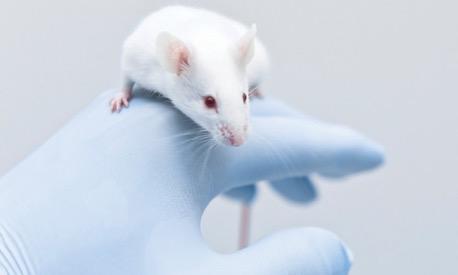
Research accomplishments of ACF have been funded by federal agencies such as the National Institutes of Health. In addition, several MMC research publications use the ACF as a research resource.
The IVIS® SpectrumCT preclinical invivo imaging system is a state-ofthe-art imager that offers 2D and 3D imaging capabilities and includes integrated low-dose microCT ideal for longitudinal studies. The system provides researchers with greater insights into complex biological systems by enabling simultaneous molecular and anatomical noninvasive imaging in animal models. The IVIS Spectrum can be used in oncology research, infectious disease, inflammation studies, metabolic disease, neurology, gene therapy, stem cell biology, cardiovascular disease, immunology, transplantation biology, and drug metabolism.
The ACF is equipped with Tecniplast BSC-II biosafety cabinets,
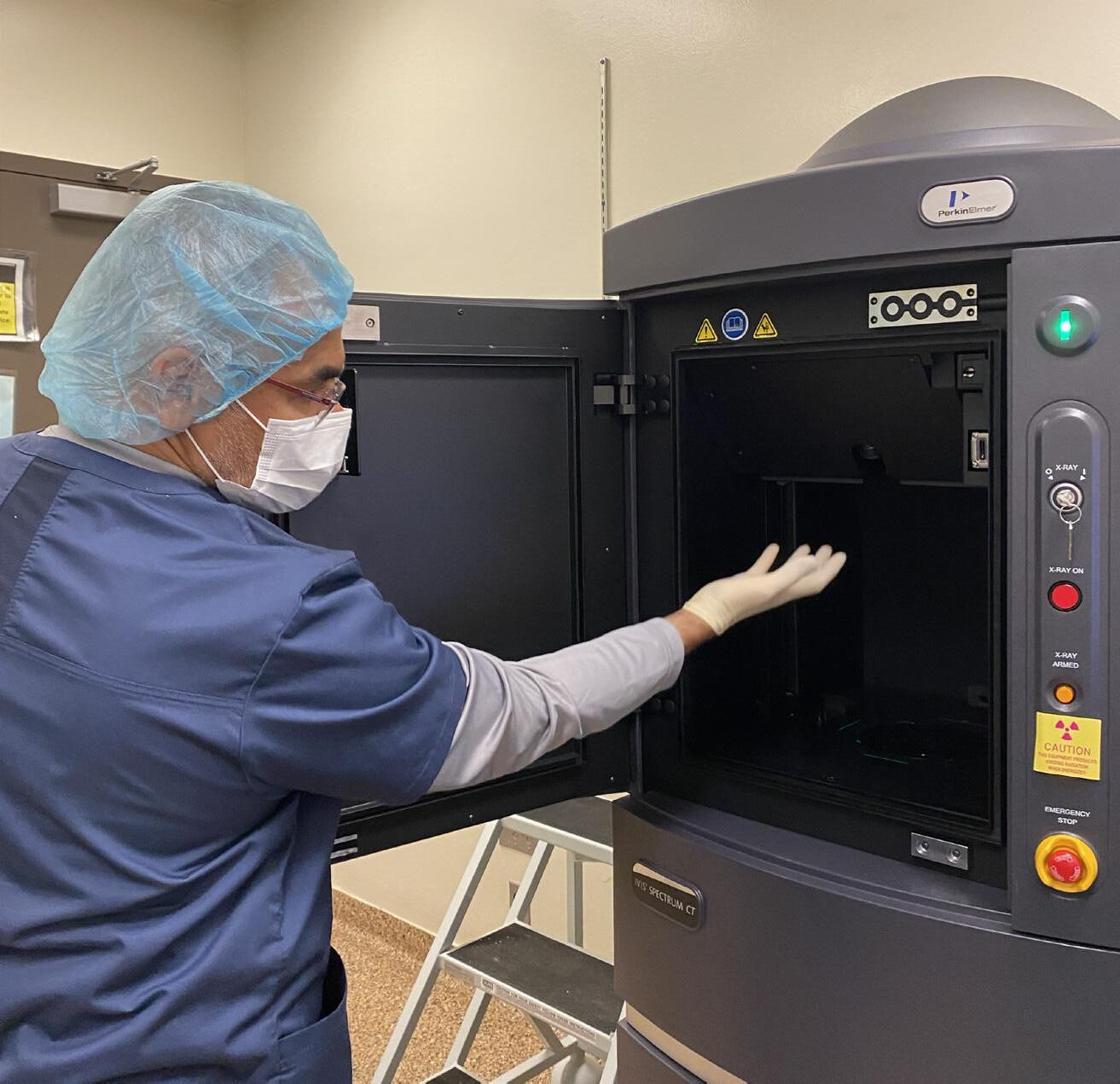
offers the ultimate performance and range of applications for in vivo imaging — leading edge molecular and anatomical imaging in a single integrated system.

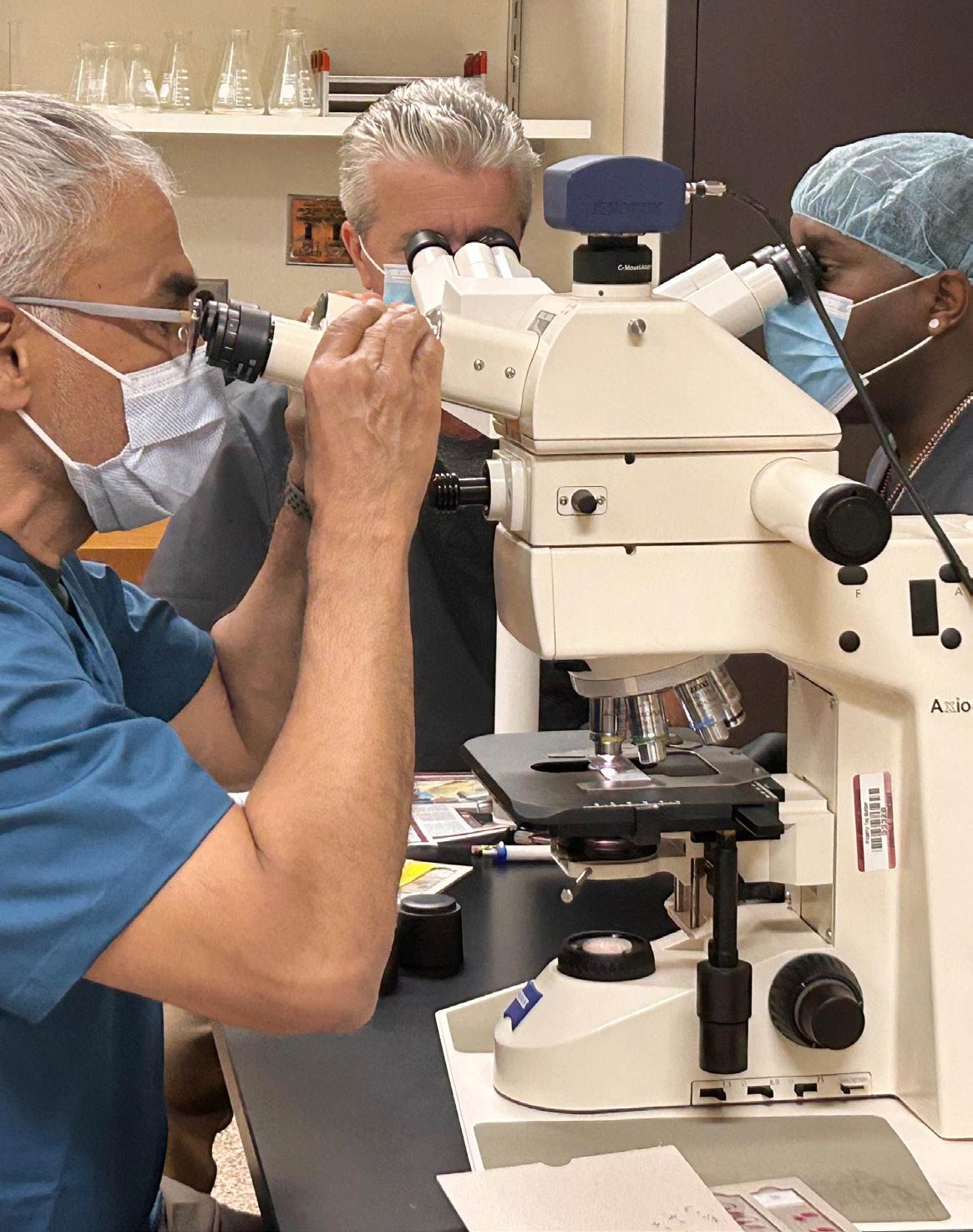
Lab Products Stay-Clean™ Workbenchs, Tecniplast CS 5 EVO plus animal change stations, and IsoTech/SurgiVet Isoflurane Vaporizers. All hoods and vaporizers are mobile and are serviced and certified annually.
Animal housing equipment include Tecniplast green line seal safe ventilated mouse and rat racks, Optimice and Optirat rack systems that provide highest density housing with odor and allergens containment. Lab Products micro-Isolator static cages for mice and rats, Allentown standard rabbit and guinea pig racks, Avidity animal watering system.
Pathology support is provided by a trained comparative pathologist and the lab contains a multiheaded Zeiss microscope equipped with a camera system for tissue histological examination and micrography.
The ACF is a secure research facility with a restricted entrance for approved users. ACF is monitored 24/7 with a security surveillance system.
The Meharry Bioinformatics Core provides state-of-the-art training, instrumentation, services and bioinformatics-driven data analysis to the Meharry research community. We specialize in Genomics and Transcriptomics through advanced data analysis.
Our Core Resources provide Meharry investigators and our external collaborators with the tools and expertise needed for high performance computation in Systems Biology and Biological Network Analysis. It is our aim to keep this facility up-to-date computationally and intellectually for our researchers and trainees.
Research accomplishments within the school have been funded by federal agencies such as the Health Resources & Services Administration, the National Cancer Institute, the National Institute on Minority Health and Health Disparities, the National Institute of Allergy and Infectious Diseases, the Centers for Disease Control, the Nuclear Regulatory Commission, the National Science Foundation, the Department of Education, the National Center Minority Health/ Health Disparities, and the National Human Genome Research Institute. State funding at Meharry includes the Tennessee Department of Health. Foundation and industry funding includes the Fuji Oil Company, the American Society for Cell Biology, Das, Gilead Sciences, Inc., Astellas Pharma US, Inc., Pfizer Inc., Merck Sharp & Dohme Corp., Genetech, Inc., Bayer AG, the United Way of Metropolitan Nashville, Ford Foundation, Lakewood-Amedex, Inc., the Patient Advocate Foundation, the American Heart Association,

Open Source Bioinformatics / Analytics program expertise.
CYTOSCAPE Systems Biology Tool Kit for visualizations and biological interactions level visualizations in order to frame Omics data results into a biological context.
REDCap database domain knowledge and

During the last 30 years the overall U.S. cancer incidence and death rates have declined significantly, the rate of decline is lower in African Americans regarding the top four cancer types including cancer of the lung and bronchus, breast, colorectal, and prostate.
Data from the American Cancer Society and the National Cancer Institute (NCI) indicate that both cancer incidence and mortality rates are higher in African Americans and other Blacks (both male and female) than in the other ethnic/racial groups in the U.S. Notably, the overall 5-year cancer survival is also lowest in African Americans and other Blacks. Hence, unfortunately, African Americans and other Blacks suffer disproportionately from the burden of cancer incidence and cancer deaths in the United States, having the lowest five-year survival rates for lung, prostate, breast, colorectal, and ovarian cancers.
The trend is nearly identical in colon, lung, and ovarian cancers. Multiple factors including biological, genetics, environment, nutrition, education status, socio-economics factors, and lack of access to quality cancer health care continue to play vital roles in these health disparities. Health inequities in this country became evident by the significant number of COVID-19-related deaths among African Americans and other minorities during the recent COVID-19 pandemic.
Meharry Medical College and Vanderbilt-Ingram Cancer Center Cancer Partnership was formed in 1999 with an initial goal of enhancing cancer research capabilities of Meharry Medical to strengthen its ability to collaborate with VICC Center and to understand and address cancer health disparities in Tennessee. This cancer partnership received its first NCI U54 grant in 2001. In 2011, Tennessee State University was admitted to this partnership to form the Meharry Medical College/ Vanderbilt-Ingra Cancer Center/ Tennessee State University Cancer Partnership (MVTCP).The overarching goal of the partnership is to contribute towards understanding and addressing cancer

health disparities in our state-approved oncology clinical trials.
Since 2001, this partnership has been funded continuously by the NCI U54 grant. Our cancer partnership investigators, who have benefited from this funding, have successfully obtained NCI, Department of Defense, and other grants to promote their own research initiatives. To achieve this goal, the partnership supports several full and pilot cancer research projects, which focus on basic, translational, and population research on cancer. The partnership supports research on breast, prostate, and ovarian cancers, cancer immunology, and many other cancer-related projects.
Research accomplishments have been funded by federal agencies such as the Health Resources & Services Administration, the National Cancer Institute, the National Institute on Minority Health and Health Disparities, the National Institute of Allergy and Infectious Diseases, the National Institute of General Medical Sciences,the Centers for Disease Control, the National Science Foundation, the Department of Education, the National Center Minority Health/Health Disparities, and the National Human Genome Research Institute. State funding at Meharry includes the Tennessee Department of Health.
The mission of the Clinical & Translational Research Center (CTRC) is to provide the resources necessary to facilitate translational, community-based, and multi-center clinical research projects at Meharry. The CTRC is expanding existing programs, nurturing new investigators, and encouraging full use of our services. The CTRC can conduct your study and execute your data collection. The CTRC cultivates your scientific skill set and ensures you are on the road to independent research.
The CTRC’s current major projects include:
• the Electronic Medical Records and Genomics Trials (EMERGE) with results provided to 500 African American participants enrolled in genetic testing;
• the Nashville Early Diagnosis Lung Cancer Project;
• the PREVENTABLE Trial that researches the role of statins in individuals 75 and older and dementia and cardiovascular disease-free survival;
• the COVID-19 Vaccine Trials were CTRC-approved as site to conduct vaccine trials;
• the BAYER and AMGEN trials, which were complete in 2020 due to accrual;
• and Implementing Genomics in Clinical Practice (IGNITE) trials’ Genomic Testing to Understand and Address Renal Disease Disparity in the United States (GUARDD-US), which enrolls AfricanAmerican participants with hypertension and chronic kidney disease for APOL-1 gene testing,


• Beckman Coulter Allegra X-22 and X-22R Centrifuges
• Enterprise Refrigerator
• Ultra-low Freeze (VWR Signature Model 5606)
• American Scientific Products Biofuge A Microhematocrit
• Cell-Dyn 3500 Hemoglobin Analyzer (Pediatric Research Laboratory)
• Dupont Super-Speed Centrifuge (Pediatric Research Laboratory)
• Waters HPLC (Pediatric Research Library)
The mission of the Meharry Community Engagement Core “connects members and organizations with Meharry researchers to conduct research and share results that will improve health for communities that experience the poorest health outcomes.”
Apart from efforts to increase community capacity to engage in research and partner with them in advancing their own health-related priorities, the Community Engagement Core provides direct support to Meharry researchers, including:
1) providing community-engaged research training;
2) identifying and facilitating collaborators with various community members, such as community-based organizations;
3) identifying potential research study participants; and;
4) providing assistance for sharing research study results beyond traditional academic venues.
A Community Advisory Board, including representatives from health advocacy, health equity, and faith-based organizations, provides guidance to the Community Engagement Core and serves as one avenue for researchers to get community feedback about their research and explore potential community-academic research partnerships.


• Consultations for researcher and community members/organizations
• Partnerships with more than 100 community members and organizations
• Community Advisory Board
• Training modules for researchers and community member
• Research Volunteer Database
• Community Engagement Studios
• Community/Academic partnership development support
• Lay Research Dissemination Procedures and Methods
The computational facilities of the School of Applied Computational Sciences (SACS) collaborates with the Schools of Medicine, Dentistry, and Graduate Studies and Research to develop a curricular “thread” that uses inter-professional education and small group learning. This thread provides an introduction to the concepts of “big data” science, precision medicine and population health management.
The SACS draws from more than 25 sources within the schools, bringing together data into a structured and unstructured data ecosystem to allow aggregation, integration and analysis particularly in support of clinical operations and public health. Analyzing clinical data from outpatient services which are delivered to underserved populations in the greater Nashville area provides insights toward achieving health equity. Such data may also be available for analysis with various biorepositories as well as genomics data, providing an opportunity to apply “big data” analytic techniques to the health equity problem.
Meharry Medical College has contracted with Clearsense, a company that specializes in data management analytics, to build the data ecosystem in which all of the data and analytics will reside.
In the area of public health, the SACS has already aggregated the data from the public health exposome which incorporates publicly available health and environmental data at the neighborhood level. This data includes air quality metrics, crime statistics, information on access to affordable housing, violence, poverty and availability of grocery stores, liquor stores or other retail outlets. The data set has been used to examine the socioenvironmental and social determinants of health triggers for various chronic diseases.

SPECIALIZED ACTIVITIES
Data Ecosystem
Machine Learning
Data Mining/Predictive & Prescriptive Analytics
Meharry hosts a supercomputer Symmetric ADA in the School of Applied Computational Sciences (SACS) to meet GPU supercomputing needs of the community. ADA is a hybrid supercomputer consisting of a large memory head node and five compute nodes, each with eight AMD Radeon Instinct MI50 GPUs. In total it contains 448 AMD EPYC processor cores (896 threads), 40 MI50 GPUs and 4TB of globally shared memory, which are connected with high-speed 200 Gb/s Mellanox InfiniBand.

Under the support of a NSF MRI grant, Meharry also acquired a Symmetric CPU supercomputer, ADA Midframe, to enable large-scale memory and CPUintensive genomics studies and other vital supercomputing needs. The ADA Midframe is a cluster of six nodes with totally 768 cores. Each node contains:
• 2U Chassis 2200W dual PS 12 bay 3.5” 2 1GigE MLAN IPMI SAS/SATA3 M.2
• Two AMD EPYC 7702 datacenter processors (2.0|3.35 GHz) 64 core
• 3200 MHz ECC/Reg DDR4 LRDIMM memory (4TB for head node, 1TB for worker)
In addition, a $1M fund that Congressman Jim Cooper donated to SACS will be used to procure a powerful DELL computer cluster. Together these supercomputers provide greater versatility and superior performance to support the diverse computing needs at Meharry.
• GPU Supercomputing
• CPU Supercomputing
• Training on High Performance Computing

The Meharry Environmental Health and Toxicology Hub, funded by the U.S. Department of Energy, provides consultation, and training in sampling, analyses, and interpretation of data pertaining to environmental toxicants to the investigators and trainees from Meharry and other collaborating HBCU institutions. In addition to analytical and environmental chemistry, the Hub employs in vitro (sub cellular preparations, cell cultures) and in vivo (animal models) approaches to unravel the chemical behavior and metabolic fate of persistent toixicants in the body. We also use biomarkers (markers of exposure, effect, and susceptibility) to investigate the pathways that underlie environmentally-induced diseases.
To continually enhance and refine technology, the Environmental Health & Toxicology Hub also embarks on method development. The new technologies developed could be integrated into the curriculum to train undergraduate and graduate students in the Department of Energy, the National Institutes of Health, and the Environmental Protection Agency - Funded Programs. Additionally, these technologies could be useful for research purposes (preparing grant applications and manuscripts).
We welcome collaborations from interested faculty. Our major interests are:
• Analyses of Environmental & Biological Samples for Trace Pollutants
• Analytical Method Development & Validation
• Biomarkers in Environmental & Public Health
• Health Disparities in Exposure to Toxicants & Disease Development
Research accomplishments within the school have been funded by federal agencies such as the U.S. Department of Energy, the Environmental Protection Agency, the Centers for Disease Control and Prevention, the National Cancer Institute, the National Institute on Minority Health and Health Disparities, the National Science Foundation, and the American Cancer Society.
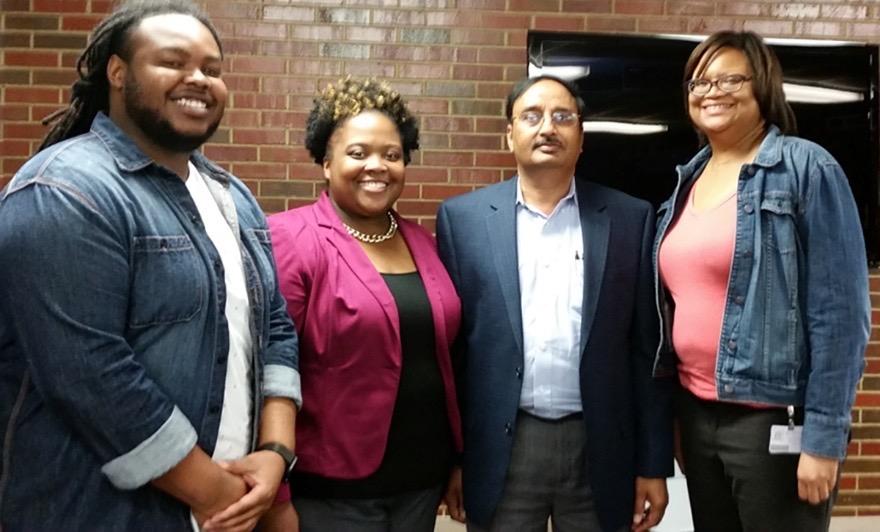

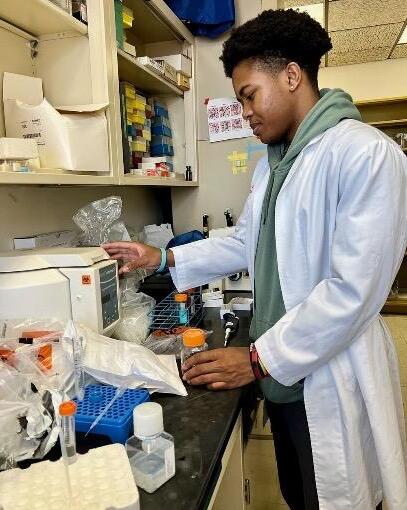
With its new Global Health Equity Institute, Meharry Medical College has established the first step in creating the School of Global Public Health. Daniel E. Dawes, J.D., an internationally-recognized health policy expert, researcher, and attorney will lead the Institute in generating a strategic plan to launch the future School, which will be the first school of its kind at a historically Black college or university. The future School will advance educational opportunities for current and prospective students while working to eliminate health disparities and increase health equity worldwide.
Meharry’s goal in launching the School is to advance educational opportunities and research that will counter structural discrimination in public health locally, nationally and globally, address upstream determinants and drivers of health, and develop innovative and sustainable solutions to improve public health for all population groups. Meharry expects the School to serve as a model of health equity research and service, as well as a pathway to expand education and knowledge that provides new resources and discoveries in public health worldwide.
Dr. James E.K. Hildreth, Ph.D., M.D., president and CEO of Meharry Medical College and Meharry identified these inequities firsthand as they worked on the front lines of pandemic response in Nashville. Meharry administered screening, testing, and vaccinations throughout the city and contributed to local and national policy decisions to control the outbreak. Dr. Hildreth was appointed by President Joe Biden as a member of the U.S. COVID-19 Health Equity Task Force and served as a leader of Nashville’s COVID-19 Task Force.
With the goal of launching the School by 2026, the first step is to create a blueprint for the School through an anti-racist lens –laying the groundwork to align with Meharry’s long-term mission of decreasing inequities in health care throughout the world. Dawes will lead Meharry’s efforts by:
• establishing the business and strategic plans
• acquiring accreditation and licensing
• staffing and recruitment of a 21-person faculty,
• and determining the resources needed for a successful launch to enroll the first cohort of students.


Meharry Medical College conducts research and other scholarly activities designed to identify, understand and eliminate factors responsible for the profoundly disproportionate burden of AIDS and HIV infection among minority populations in the United States. The medical field has made some advances in the overall health of the nation in the past three decades. However, in spite of these advances, striking disparities remain in the rates of diseases that affect the livelihood and health of racial and ethnic minorities. These disparities are inequalities that occur in the provision of health care and access to health care across different racial, ethnic, and socioeconomic groups. They affect a vast group of people that Meharry is honored to serve and enact the notion of “health caring.”


Research accomplishments within the school have been funded by federal agencies such as the Health Resources & Services Administration, the National Institute on Minority Health and Health Disparities, the National Institute of General Medical Sciences, the Substance Abuse and Mental Health Services, the Centers for Disease Control, the Metropolitan Development and Housing Agency, the National Institute of Justice, the Department of Education, the National Center Minority Health/ Health Disparities, and the National Institute of Allergy/Infectious Diseases.
Meharry Medical College conducts research and other scholarly activities designed to identify, understand, and eliminate factors responsible for the profoundly disproportionate burden of AIDS and HIV infection among minority populations in the United States. The Center is reducing the burden of AIDS in local minority communities through basic, clinical, and translational research.
Meharry Medical College is one of the nation’s first research centers devoted exclusively to understanding why women of color are at greater risk of certain diseases and how biology, race, and economics contribute to women’s health disparities. The Center is currently involved in research looking at the role of genetics in medication effectiveness for pain and depression, and how genetic testing can help reduce the burden of hypertension and kidney disease influences in the lives of women of color. The Center is also conducting studies for cancer screening in this population for early detection and treatment.
Established in 2005 to reduce cancer health disparities, the Community Networks Program engages in community-based participatory education, training and research among underserved populations.
Meharry Medical College is dedicated to promote research, training and education in infectious diseases through discovery and application of new knowledge that is seamlessly integrated with mentoring students and fellows to become the next generation of national leaders in the field.

Faculty in the Center for AIDS Health Disparities Research at Meharry Medical College address bases for HIV entry, replication and propagated infection, as well as the factors that modulate the immune response to this infection and the efficacy of therapeutic intervention.
To reduce the burden of infectious diseases including viruses, pathogenic bacteria, and parasites, faculties at Meharry are focused on the integrative approach on every aspect of infectious disease spanning from basic, clinical, behavioral and social, translational, and implementation sciences to enhance collaborative and innovative research.
Research accomplishments within the school have been funded by federal agencies such as the Health Resources & Services Administration, the National Cancer Institute, the National institute on Drug Abuse, the National Institute on Minority Health and Health Disparities, the National Institute of Allergy and Infectious Diseases, the National Institute of General Medical Sciences, the Centers for Disease Control, the National Science Foundation, the Department of Education, the National Center Minority Health/Health Disparities, and the National Human Genome Research Institute.
• BSL-3 laboratory for restricted pathogens • FACSAria III • Biotek Synergy Neo2BSL-3 mutli-mode

High Throughput Reader for drug discovery • program software i.e. Nanodrop1000 and 2000 • LI-COR, BIO rad spectrometers • Synergy
microplate reader • Real Time PCRCFX96 c1000 Thermo Finnegan
LTQ Ion Trap Mass Spectrometer
• AB Sciex Tempo Nano- 1 Dplus
HPLC • AB Sciex 920 Auto sampler with cooling module • Nano SPRAY
ESI source • Thermo Scientific Xcalibur Mass Spectrometry
Controller Software • Thermo
Scientific Proteome Discoverer Mass
Informatics Platform Software • LI-Cor odyssey, Agilent 2100 Bioanalyzer • genetic analyzer ABI Hitachi
Graduate, medical, and dental scholars are trained to conduct basic, translational, clinical, social, and behavioral research generating new knowledge that contributes to research in an effort to reduce health disparities in the areas of neurological disease, mental health, sleep and cognition, drug abuse/addiction, and chronic pain. Along those same lines, we provide students with an intensive and integrated knowledge of neuroscience including neuroanatomy, neuropharmacology, and clinical aspects, and expose them to research methodologies that span from molecular and cellular to systems level approaches including human subjects research. Students gain a problemsolving approach to the understanding of neuroscience that makes a reasoned, objective correlation between neuroscience and other types of knowledge; this approach serves as both a foundation and methodology toward developing solutions.

Research accomplishments within the school have been funded by federal agencies such as the National Institute of Neurological Disorders and Stroke, the National Institute of Mental Health, the National Institute of Dental and Craniofacial Research, the National Institute of Drug Abuse, the National Institute of Minority Health and Health Disparities, the National Institute of General Medical Sciences, and the National Science Foundation. Electrophysiology equipment for in-vivo electrophysiology and electropharmacology• Equipment for behavioral studies. Nikon A1R laser and resonance scanning confocal microscope. Nikon TIRF microscope. Orbitrap Exploris 120 Mass Spectrometer with RSLC 3000 nano-chromatograph • Bio-Rad NGC 100 LC system with fraction collector• Agilent 1260 Infinity II analytical UHPLC• Nicoya OpenSPR surface plasmon resonance instrument • Zeta View exosome particle analyzer• ProteinSimple Wes automated Western blot system• Real Time PCR-CFX96 c1000 • LI-Cor Odyssey imaging system, • Hitachi ABI 3100 genetic analyzer • BD FACSAria III Flow cytometer• Nanodrop 2000 spectrophotometer• Synergy microplate reader• BSL-3 laboratory for restricted pathogens• Specialized software packages for Genomics (CLC Genomics Workbench), Proteomics (PEAKS), and statistical analysis (MATLAB)
Meharry Medical College remains at the forefront in dental research, which consists of evaluation, diagnosis, prevention, and treatment of diseases, disorders, and conditions of the soft and hard tissues of the jaw, the oral cavity, maxillofacial area, and the adjacent and associated structures and their impact on the rest of the human body. By selecting a diverse body of students who individually demonstrate a commitment to service, possess cultural understanding, indicate the ability to successfully complete the rigorous curriculum, conduct research, and serve underserved populations in the Meharry tradition, the School of Dentistry plays a vital role in meeting the oral health care needs of everyone. Our graduates have received international recognition for their achievements, performance, and research blazing trails with innovative ideas.
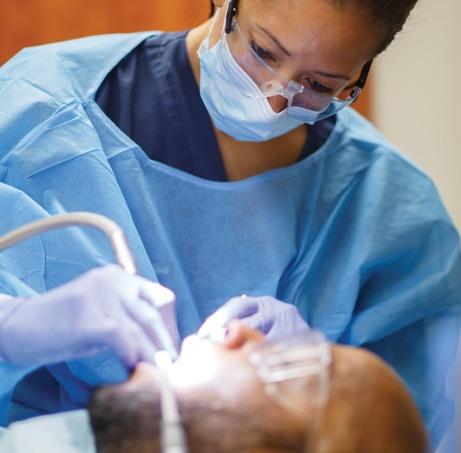
Research accomplishments within the school, and/or with the collaboration of other schools, have been funded by federal agencies such as National Dental Association Foundation, the Health Resources & Services Administration, DentaQuest, the National Institutes of Health: [National Institute of Dental and Craniofacial Research, National Institute of Diabetes and Digestive and Kidney Diseases, and the National Institute of Minority Health and Health Disparities, the National Institute of Allergy and Infectious Diseases, and the National Institute of General Medical Sciences], and the Centers for Disease Control.
Our team of faculty, highly trained dental students, residents, and friendly staff are dedicated to helping you achieve and maintain excellent oral health by offering a full range of general and specialty dental services in the following areas:
• Restorative Dentistry
• Oral and Maxillofacial Surgery
• Endodontics
• Periodontics
• Oral Diagnostic Sciences & Research
• Pediatric Dentistry
• Orthodontics
• Dental Public Health

The Meharry Research Core Facilities are ready to support transdisciplinary research spanning micro to macro scales of inquiry in pursuit of health equity.
The Molecular Biology Core provides convenient access to molecular biological shared equipment, as well as training and technical assistance for use of the instruments. Equipment and resources for molecular biology applications are readily available and reside in the Core Laboratory or in common equipment rooms and corridors in the West Basic Science building. Training in the proper use of equipment is provided by MRRCC staff and also as needed by vendor technical personnel.
• Odyssey Model 1785 Infrared Imaging System
• ChemiDoc Gel Imaging Systems (BioRad)
• CFX96 Touch Real-Time PCR Systems (BioRad)
• CFX384 Touch Real-Time PCR System (BioRad)
• NanoDrop One Microvolume UV-Vis Spectrophotometer (Thermo Fisher)
• NanoDrop 2000c Spectrophotometer (Thermo Fisher)
• 4150 TapeStation Bioanalyser (Agilent)
• ZetaView Nanoparticle Analyzer (ParticleMetrix)
There are two analysis computers available for researchers use and to analyze data from the Core equipment with specialized software available.
The Meharry Bioinformatics Core provides state-of-the-art training, instrumentation, services and bioinformatics and clinical informatics data analysis to the Meharry Community, ranging from experimental design through to advanced data analysis and integration of Multi-Omics data sets, thus enhancing biomedical research and discovery. This Core Resources provides Meharry investigators and trainees with the tools and expertise needed for high performance computation in Genomics, Proteomics, Systems Biology, and Biological Network Analysis.
We provide analysis and training for: Genomics, Transcriptomics, Clinical and Medical Informatics, and Systems Biology.

The BSL-3 Lab provides a safe environment for the investigation of infectious pathogens. The design of the lab limits exposure to such agents. The laboratory personnel have specific training in proper handling procedures.

The Biostatistics Core in Meharry’s School of Graduate Studies provides a range of statistical services. These services include descriptive, inferential, exploratory, causal, and predictive analyses.
The Flow Cytometry Core provides advance instrumentation and high level technical and scientific expertise in multi-dimensional Flow Cytometry and Cell Sorting, Equipment includes FACSAria III, CytoFLEX S Flow Cytometer, and the Luminex Aminis® CellStream Flow Cytometer.
The Genomics Data Core provides state-of-the-art, comprehensive next generation sequencing (NGS)focused services, and multi-level professional training and consultation, to support basic, clinical, and translational research. Specifically, it provides NGS data analysis, including analyses of whole genome, whole exome, whole transcriptome Chromatin immunoprecipitation followed by sequencing (ChIP-seq), single-cell sequencing, targeted sequencing data, and assembly and analysis of long-read sequencing data, etc.

The Gene Editing Service Core provides internal and external investigators access to state-of-the-art genome editing technologies. Our dedicated technical staff assists with the high-efficiency generation of genetically knockout or knockin cells in cell lines and progenitor cells.
The Meharry Human Tissue and Pathology Core provides tissue collection and storage services and access to human tissue, histology services, and specialized equipment. Histology services include Hematoxylin and Eosin staining, frozen sectioning, special staining, immunohistochemistry, and other specialized processing and sectioning services.
The Fluorescence Microscopy Morphology Core provides expertise and state-of-the-art instrumentation for performing fluorescence and bright-field microscopy to investigators. This sub-core also contains resources for immunostaining of cells and fixed tissues. It provides investigators access to a Nikon A1R confocal laser scanning microscope, TIRF and super-resolution STORM microscope, Nikon TE2000-E fully automated widefield fluorescence microscope, and a variety of fluorescent and bright-field imagers such as the BioTek Cytation 5 and Synergy Neo2 microplate reader with plate loader/stacker (Alpha scans), as well as EVOS and Keyence BZ-X700 microscopes with options for whole-slide stitched image, time-lapse experiments in five percent CO2 atmosphere, and other live cell conditions.
Human Tissue Acquisition and Pathology services coordinates with Meharry clinics and Nashville General Hospital to offer clinical specimen, histology, and immunohistochemistry support for clinical and translational researchers.
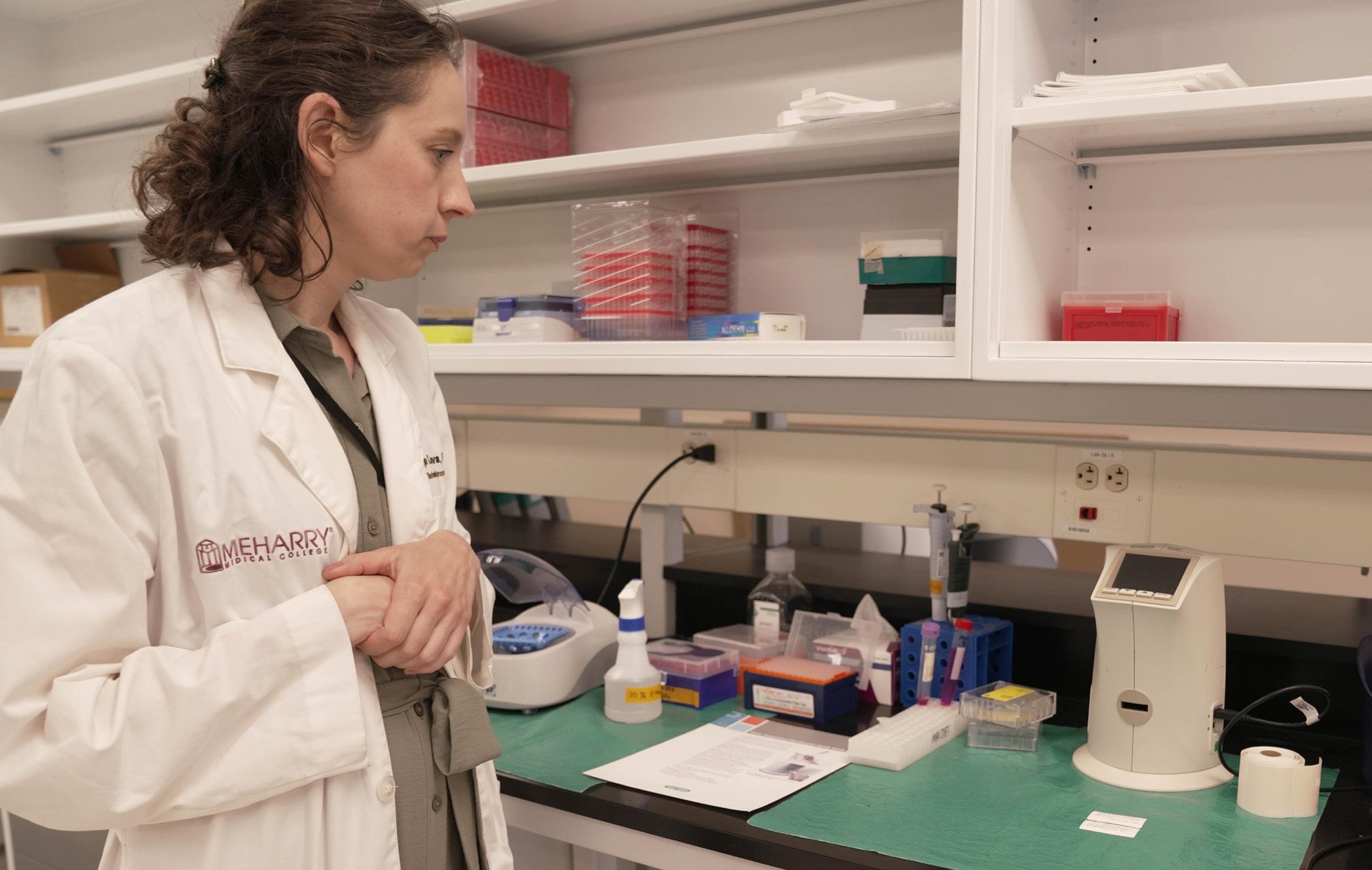
Proteomics sub-core specializes in bottom-up LC-MS based global proteomics analysis. In addition, we offer targeted small molecule LC-MS analysis and a variety of protein analysis techniques (FPLC, UHPLC, and SPR).
Services:
• Shotgun Proteomics analysis with optional PTM analysis
• MudPIT analysis with optional label-based quantification (SILAC or TMT) and optional PTM analysis
• Targeted small molecule LC-MS analysis
• Self-served protein analysis/purification (FPLC, UHPLC, SPR)
Equipment:
• Thermo Orbitrap Exploris 120 Mass Spectrometer in tandem with RSLC 3000 nanochromatograph and auto-sampler (core-operated)
• Bio-Rad NGC 100 LC system with fraction collector (user-operated)
• Agilent 1260 Infinity II analytical UHPLC (user-operated)
• Nicoya OpenSPR surface plasmon resonance instrument (user-operated)
• Zeta View exosome particle analyzer (user-operated)

